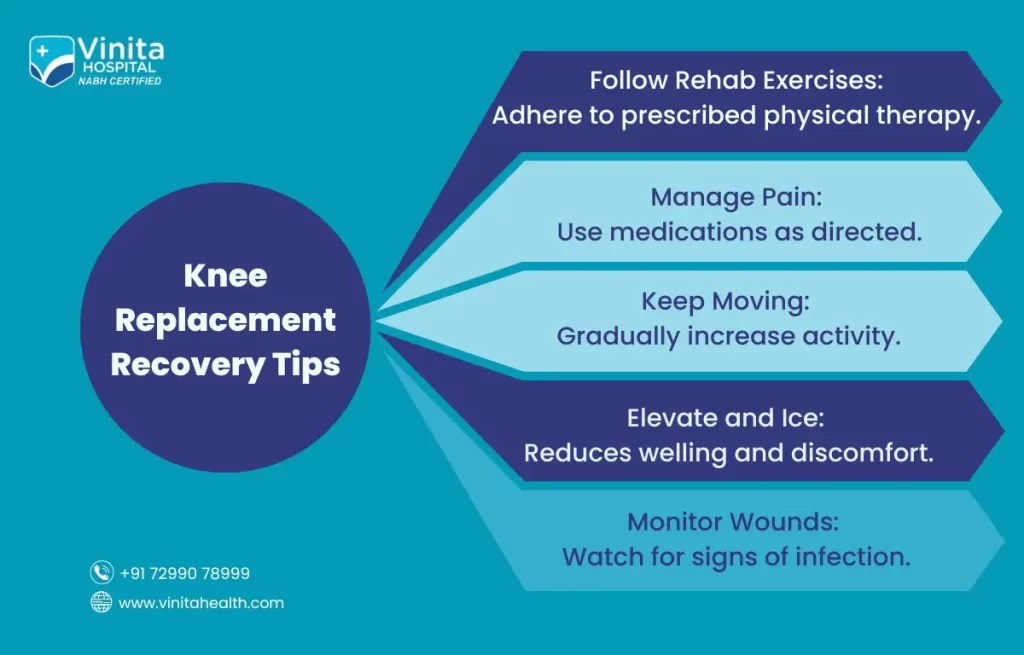Knee replacement recovery tips are essential for anyone who has undergone this common yet significant surgical procedure. Proper recovery practices can drastically influence the outcome and long-term success of the surgery. Whether you’re preparing for knee replacement surgery or already in the recovery phase, understanding the best recovery tips can help you regain mobility and improve your quality of life.
Importance of Knee Replacement Recovery Tips
Knee replacement recovery tips are crucial because they help patients navigate the critical post-surgery period effectively. These tips include exercises, dietary recommendations, and lifestyle changes that aid in reducing pain, improving mobility, and preventing complications. In the following sections, we’ll explore various strategies and techniques to ensure a smooth and successful recovery.

The Initial Days Post-Surgery
Managing Pain and Swelling
Immediately after the surgery, managing pain and swelling is a top priority. Knee replacement recovery tips in this phase include:
- Medication: Follow your doctor’s prescription for pain relief medication diligently.
- Ice Therapy: Use ice packs to minimize swelling and alleviate pain.
- Elevation: Raise your leg to help reduce swelling.
Early Mobilization
Starting to move as soon as possible is vital. Here are some tips for recovering from knee surgery:
- Physical Therapy: Engage in physical therapy sessions as recommended by your healthcare provider.
- Assistive Devices: Use crutches or walkers to aid mobility without putting too much strain on your knee.
- Gentle Exercises: Perform gentle exercises to improve circulation and prevent stiffness.
Weeks 1-4: Building Strength and Flexibility
Exercise Routine
Developing strength and flexibility is crucial for a successful recovery. Knee replacement surgery recovery tips for this period include:
- Regular Exercise: Participate in low-impact activities like walking, swimming, and cycling.
- Stretching: Include stretching exercises to enhance flexibility and prevent muscle stiffness.
- Strength Training: Focus on strengthening the muscles around the knee to provide better support.
Nutrition and Hydration
Proper nutrition plays a critical role in recovery. Here are some tips after knee surgery regarding diet:
- Balanced Diet: Eat foods rich in proteins, vitamins, and minerals to support healing.
- Hydration: Stay hydrated by drinking plenty of water to aid in overall health and recovery.
- Supplements: Consider supplements like calcium and vitamin D, but only after consulting with your doctor.
Months 2-6: Advanced Recovery and Returning to Normal Activities
Gradual Increase in Activity
As you progress in your recovery, gradually increasing your activity level is crucial. More knee replacement recovery tips for this phase include:
- Activity Modification: Slowly reintroduce daily activities and hobbies, avoiding high-impact sports initially.
- Monitoring Progress: Keep track of your progress and adjust your activities based on your comfort and doctor’s advice.
- Pain Management: Continue to manage pain with prescribed medications and other therapies as needed.
Physical Therapy and Rehabilitation
Ongoing physical therapy and rehabilitation are vital for a full recovery. Here are additional knee surgery recovery tips:
- Regular Sessions: Attend all scheduled physical therapy sessions to ensure consistent progress.
- Advanced Exercises: Incorporate more advanced exercises as recommended by your therapist to further strengthen the knee.
- Home Exercises: Continue doing prescribed exercises at home to maintain progress.
Long-Term Maintenance and Preventing Complications
Lifestyle Changes
Long-term maintenance is key to preventing complications. Here are some knee replacement surgery recovery tips for long-term care:
- Weight Management: Maintain a healthy weight to reduce strain on your knee joint.
- Regular Check-ups: Schedule regular follow-ups with your healthcare provider to monitor the knee’s condition.
- Avoiding Strain: Avoid activities that put excessive strain on your knee, such as heavy lifting or high-impact sports.
Mental and Emotional Well-being
Recovery isn’t just physical; it’s also mental. Some tips after knee surgery for mental well-being include:
- Support System: Lean on your support system, including family and friends, for emotional support.
- Patience and Persistence: Stay patient and persistent with your recovery process, as it can be lengthy.
- Positive Outlook: Maintain a positive outlook and celebrate small milestones in your recovery journey.
Knee Replacement Recovery Timeline
- Week 1-2: Early Recovery
- Focus on pain management, wound care, and gentle exercises to improve flexibility.
- Start with assisted walking using crutches or a walker.
- Perform physical therapy exercises daily to prevent stiffness and improve circulation.
- Apply ice packs to reduce swelling.
- Week 3-6: Intermediate Recovery
- Gradually increase walking distances and start moving around without assistance.
- Continue physical therapy to strengthen the knee and surrounding muscles.
- Avoid strenuous activities, but engage in low-impact exercises like cycling.
- Monitor for any signs of infection or complications.
- Week 7-12: Advanced Recovery
- You should be able to walk independently and resume most daily activities.
- Incorporate more challenging exercises, such as stair climbing, to build strength.
- Continue following knee surgery recovery tips to maintain progress.
- Consult your doctor before resuming high-impact activities like running.
- Beyond 12 Weeks: Full Recovery
- Most patients reach significant recovery milestones by this time.
- Continue regular check-ups with your doctor to monitor progress.
- Engage in a consistent exercise routine to maintain joint flexibility and strength.
Conclusion
Knee replacement recovery tips are indispensable for a smooth and successful recovery process. By following these guidelines, you can significantly improve your mobility, reduce pain, and enhance your overall quality of life post-surgery. Remember to consult with your healthcare provider regularly and stay committed to your recovery plan. With the right approach and mindset, you can achieve a full and healthy recovery.
Read also Natural Treatment for Gallstones.





